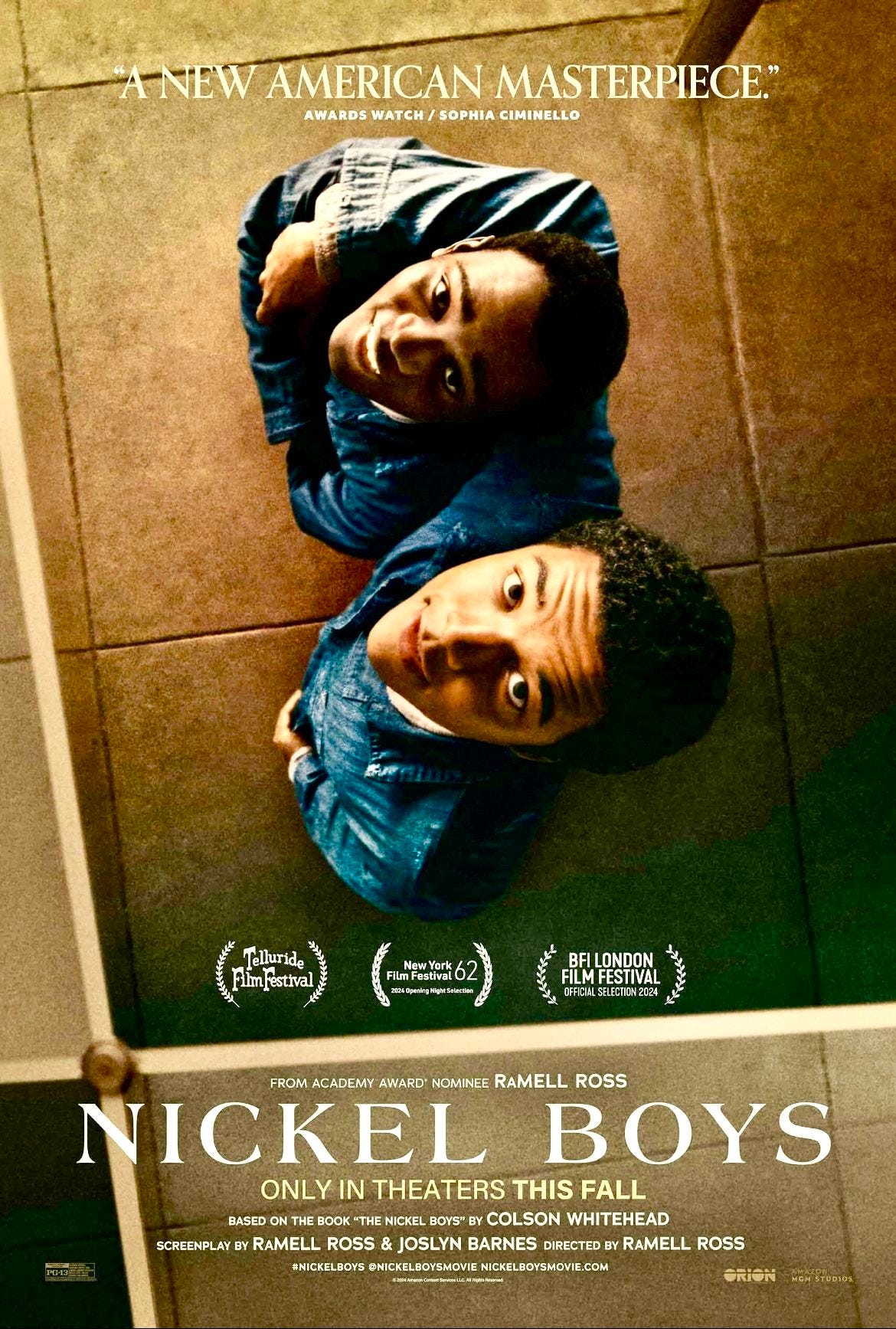Yesterday I got to see two movies, Nickel Boys and Companion. Today there is a nationwide protest planned at every state capitol. I also need to go grocery shopping. Day to day life is a constant, even in a fascist regime. It’s one of the things that breaks people’s brains, because the atrocities don’t hit you until they do.
A lot of people are struggling with the idea that Project 2025 wasn’t just a regressive pipe dream and that the rule of law breaks down when no one enforces it. That reality is palpable and pervasive, at the movie theaters, the grocery store and the nationwide protests that are just getting started.
Prophets have foretold this day in America, for as long as I’ve been consuming media at least, and it’s not the first time fascism has taken root in this nation. We fought a war over the “right” to own people, an issue that got rebranded with the Thirteenth Amendment and still persists to this day. Prison labor is slave labor. We still keep people in captivity and exploit their labor.
So while people are focusing on the parallels to Nazi Germany, and those comparisons are apt, I continue to dwell on how fascism has always persisted in our nation. How white supremacy is in the very fiber of our nation. How patriarchial views perpetuate regressive ideals that allow fascism to take root.
Thankfully, I’ve got a lot of other people with different perspectives dwelling on those same thoughts and they make great art to boot. Yesterday, I got to see both Nickel Boys and Companion in theaters, and they both surprised me. Not in their quality or message, but in how those stories were told.
Nickel Boys
I saw Presence last week and one of my friends mentioned how it was filmed in a similar first person perspective to Nickel Boys. He also mentioned that the film was excellent. Not the first time I’ve heard a glowing review. RaMell Ross’s flick made a lot of noise on the awards circuit and has hung around our local indie theater for a minute, so I decided to carve out some time during the day to see it with my mom.
She had read the book and was curious to see how it had been adapted to the big screen. I have not read any of Colson Whitehead’s work, but after this I feel I’ve done myself a disservice. Starring Ethan Herisse as Elwood and Brandon Wilson as Turner, Nickel Boys tells the story of two young men who are imprisoned at Nickel Academy, a internally segregated reformatory school in Jim Crow Florida. The boys are the core of the film and their excellent performances make it all work.
Told non-linearly, the movie jumps between the 60s and the early 2000s and is interspersed with news segments and surrealist nightmares. Opening with a first person montage is jarring, but it sets the tone for the movie. We see Elwood as an example of the new black experience, he is still confronted by the realities of racism but he has a chance at a brighter future.
He is falling in love, he has a teacher invested in him and even a scholarship to an HBCU. He’s involved in the civil rights movement. Even though his parents are no longer with him, his grandmother cares for him and encourages him to seize the future. When Elwood is hitchhiking to the college, he’s picked up by a man driving a stolen car. Wrong place, wrong time, wrong color.
Ross never tells us what to think, just uses the horrors of the real world and the character’s minds and lets us draw our own conclusions. Nightmares and daydreams are littered throughout the film, presented in a surreal manner that calls to mind David Lynch or the torture from A Clockwork Orange. There’s no handholding here, which can make it difficult to find the groove at the beginning, but once the film reaches the school I was swept up in the vision.
From there, we’re treated to an alternate perspective in the way of Turner. We see that the more things have changed, the more they stay the same for people at the bottom of the ladder. A series of injustices are inflicted on the boys, from inhumane punishment for minor infractions to being forced to work for the white people in and around the school.
Turner represents the reality for a lot of children, just trying to survive in a world that rejected them before they had a chance. His only crime, as far as we see, is being black. Where Elwood represents a strive for equality, Turner represents a need for survival. Both boys are brilliant, thoughtful and compassionate. Seeing the effect that they have on each other is touching and how they help each other grow is inspiring.
And their words to each other feel genuine, even when the realities that Turner (and life) expose to Elwood, Elwood still fights for a better world. The threat of violence and death looms if they don’t follow the “rules,” dispensed with great malice by Spencer (Hamish Linklater), the school’s administrator and de facto warden.
Turner also works with Harper (Fred Hechinger), a more progressive white man who still exploits the black people in his life. Linklater is strong as usual, but Hechinger gives the best performance of his career. At one point, he tells Turner how lucky the black child is because he won’t be drafted. As though his position was worse than Turner’s. Harper feels like the kind of person who would tell you all the reasons they aren’t racist and you can even see why he might think it. And he’s still at his core a white supremacist.
Nickel Boys is a horror movie presented as a historical drama. An assault on white supremacy and privilege that runs into the buzzsaw of consequence. The consequences of daring to exist. Of wanting a better life.
There is great tragedy here, but maybe the biggest is how the boys grapple with doing the right thing when they see what happens when you do. When the boys overhear a classmate being told to take a dive in a fight against a white boy, we know that there’s no good option for him. The boys know it too.
By the time the film has concluded, the weight of it lays heavy. Ross and screenwriter Joslyn Barnes have adapted a story that feels honest and real. A story we hear all too often. Of institutional racism, unfair policing and the subtle ways racism haunts people.
Companion
If Nickel Boys is a horror film presented as historical drama, Companion is an action comedy film presented as a horror flick. Don’t get me wrong, there are some truly terrifying moments in this film, especially as Josh (Jack Quaid) allows his nice guy veneer to slip. And the life that Iris (Sophie Thatcher) lives is a waking nightmare. This film smashes through subtext with a sledgehammer and I still think people will miss the point.
The story is about a woman named Iris who is in an abusive relationship with a man named Jack. It is told with the kinetic bombast and deadpan sarcasm of a Spike Jonze movie. Moments in the film called to mind Eternal Sunshine of the Spotless Mind, it would be hard to not see Charlie Kaufman as an influence. High concept movies have a tendency to make the idea the story, instead of setting the story in an idea.
There are narrative twists that writer and director Drew Hancock breadcrumbs out, so nothing is really a surprise when you think about it. I knew the bent that the film took before going in, but some people will want to go in as blind as possible and I respect that. So, I’ll try to stay spoiler light.
Iris remembers the first time she met Josh, a meet-cute in a grocery store and it was love at first sight. She tells us that that moment was one of two that made her feel alive. The other is when she killed Josh. Josh wakes Iris up on a car ride to a secluded lake house, where they are going away with his friends. They seem to be a perfect couple and Iris loves him.
Josh’s controlling behavior is off putting to the audience, but not to Iris. They are in love. It comes in little moments and casual neglects, the way he dismisses her desire to go sit by the lake. An idea he had, mind you. One that was no longer on the table because he partied too much the night before. Neglecting her to talk to Kat (Megan Suri), a friend of his who is cold to Iris. At least Eli (Harvey Guillén) and his boyfriend Patrick (Lukas Gage) are welcoming to her.
On the beach, Iris is interrupted by Sergie (Rupert Friend). Sergie is their host and he doesn’t own the lake, just all the land around it. He orders Iris to stay and pressures her into putting lotion on his back. When his ulterior motives emerge, Iris fights back.
The next time we see her she is covered in blood and the movie changes gears. We learn more about who Josh really is and Iris’ world is shattered. An allegory for abusive relationships and male entitlement, I wasn’t prepared for how funny the whole thing was.
Hancock pulls no punches in his assault on the ways abusers inflict their pain, but he also was merciless in his take down of bullies. Of nice guy personas. Quaid is fantastic as a villain hiding in plain sight. The way his microaggressions can be handwaved but when totalled up show him for the person he really is. A loser with no personal accountability who uses everyone around him.
Thatcher, who impressed in Heretic, commands the show as a women learning about the horrific reality of her boyfriend and coming to terms with her worth. Her journey to empowerment is a primal scream in the face of entitled people who crave control. Watching Iris regain her humanity is stirring and her finding fortitude to break the hold Josh has on her is exhilarating. When the image she had of Josh finally shatters, it is gut-wrenching.
There’s a tongue-in-cheek, Diablo Cody feel to the whole affair. Iris is honest to a fault, as Josh reminds her she couldn’t lie to him if she wanted to. So, she tells truths about the people around her that cut to their core. It’s insightful and hilarious. Hancock plays with women in peril and final girl tropes, dismantling and reassembling them with glee. The result is one of the strongest entries in the 'good for her' canon of horror films.
Today, like every day, is going to be a tough one. Just remember to find the reasons to keep fighting, enjoying life is a part of what we are fighting for.





